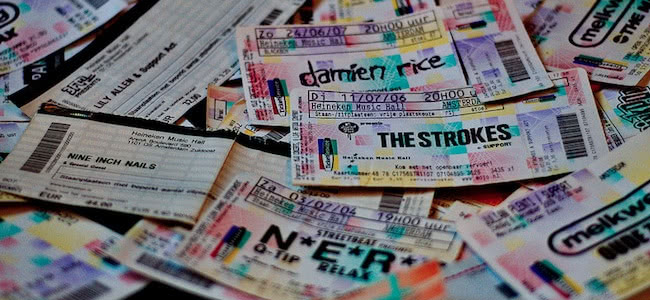Premier Barry O’Farrell and the New South Wales state government are finalising the introduction of new laws that will aggressively crackdown upon ticket scalpers of music and sports events from selling on tickets at inflated prices.
Under the proposed law reforms, concert promoters, event officials, and sports organisers would be given the power to control and enforce their own terms and conditions on ticket sales in order to prevent opportunistic scalpers from preying on fans by profiteering from ridiculously inflated prices.
NSW Fair Trading Commissioner Rod Stowe said the changes would give promoters legal power to refuse entry to punters who had purchased their ticket in breach of terms and conditions, which they would now be able to set in order to prevent profiteering by scalpers.
Official ticket vendors would also be given flexibility to allow fans to offload tickets an agreed mark-up price – or simply ban on-selling altogether, just as NRL bosses did when they cancelled 100 grand final tickets that a scalper was flogging the $165 tickets for $260 each, attempting to pocket $9,500.
Fair Trading Minister Anthony Roberts, who first proposed the new legislation along with Sports Minister Graham Annesley in February, tells News Ltd that the anti-scalping laws would be pushed through by September, in time for the football finals series but perhaps not passed in time for the grand final.
“We want to give fans a fair go at buying tickets, while also protecting fans from rip-offs and fraud,” said Mr Roberts, while former NRL employee Minister Annesley said the new measures were aimed at scalpers, who are “unscrupulous profiteers motivated only by greed.” “We want to give fans a fair go at buying tickets, while also protecting fans from rip-offs and fraud.” – Fair Trading Minister Anthony Roberts
Minister Annesley added the government crackdown would not target secondary markets, such as online auction site eBay or trading website Gumtree, as they offered genuine fans to sell on tickets if they were unable to make an event.
Love Music?
Get your daily dose of metal, rock, indie, pop, and everything else in between.
The anti-scalper laws noticeably coincide with the increased presence of Swiss-born online ticket exchange service viagogo, which regularly sells scalper’s tickets at increased prices, often before the passes have been released to the general public.
Viagogo has listed exorbitant prices – in some cases double the official price – for popular arena tours like Pink‘s sold out shows and Beyonce’s forthcoming Australian tour. Elsewhere on the site, tickets to Muse’s end-of-year Australian Tour are up to $50 more than the retail price from promoters The Frontier Touring Company, while tickets to Stereosonic 2013 are nearly double the festival’s asking price at around $540 or more – which the festival itself warned about ahead of the tickets to the electronic music festival going on sale.
Under the new state government legislation, ticket sellers using sites like viagogo would have to provide visual confirmation of the ticket in the form of a photograph showing the seat number, providing more transparent means to track and sort legitimate sellers from the scalpers.
Ticket companies like Moshtix, Ticketmaster, and Showbiz have voiced their concerns over government involvement in their industry, saying that it should be self-regulated with customer protections over the transferral of tickets and sell-backs between punters. “I haven’t seen the proposals but I don’t believe governments should be involved in a free market,” said Craig McMaster, Chief Executive of Showbiz.
Festivals such as Splendour In The Grass and Stereosonic have self-regulated the re-sale of tickets in order to minimise scalping, working to co-operate with sites such as Gumtree to ensure that tickets are going to those who are actually planning on attending the events as opposed to those who are simply looking for a quick profit.
Meanwhile, the world’s biggest concert promoters Live Nation are giving Ticketmaster a $100 million upgrade to combat ticket scalpers, an investment to help “move it forward from its 1980s technology that it had when we did the merger in 2010,” said Live Nation COO Joe Berchtold. “Part of this $100m we’re spending is about figuring out how to do a better job stopping bots,” he added. “We need to reduce the scalpers’ ability to go in and get the number of good tickets they’re getting.”

































